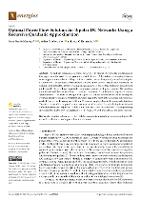Optimal Power Flow Solution for Bipolar DC Networks Using a Recursive Quadratic Approximation
Fecha
2023-01-04Autor(es)
Montoya, Oscar Danilo
Gil-González, Walter
Hernández, Jesús C
Metadatos
Mostrar el registro completo del ítemResumen
settingsOrder Article Reprints
Open AccessArticle
Optimal Power Flow Solution for Bipolar DC Networks Using a Recursive Quadratic Approximation
by Oscar Danilo Montoya 1,2,*ORCID,Walter Gil-González 3ORCID andJesus C. Hernández 4,*ORCID
1
Grupo de Compatibilidad e Interferencia Electromagnética (GCEM), Facultad de Ingeniería, Universidad Distrital Francisco José de Caldas, Bogotá 110231, Colombia
2
Laboratorio Inteligente de Energía, Facultad de Ingeniería, Universidad Tecnológica de Bolívar, Cartagena 131001, Colombia
3
Department of Electrical Engineering, Universidad Tecnológica de Pereira, Pereira 660003, Colombia
4
Department of Electrical Engineering, University of Jaén, Campus Lagunillas s/n, Edificio A3, 23071 Jaén, Spain
*
Authors to whom correspondence should be addressed.
Energies 2023, 16(2), 589; https://doi.org/10.3390/en16020589
Received: 30 November 2022 / Revised: 23 December 2022 / Accepted: 29 December 2022 / Published: 4 January 2023
(This article belongs to the Collection Featured Papers in Electrical Power and Energy System)
Download Browse Figures Versions Notes
Abstract
The problem regarding of optimal power flow in bipolar DC networks is addressed in this paper from the recursive programming stand of view. A hyperbolic relationship between constant power terminals and voltage profiles is used to resolve the optimal power flow in bipolar DC networks. The proposed approximation is based on the Taylors’ Taylor series expansion. In addition, nonlinear relationships between dispersed generators and voltage profiles are relaxed based on the small voltage voltage-magnitude variations in contrast with power output. The resulting optimization model transforms the exact nonlinear non-convex formulation into a quadratic convex approximation. The main advantage of the quadratic convex reformulation lies in finding the optimum global via recursive programming, which adjusts the point until the desired convergence is reached. Two test feeders composed of 21 and 33 buses are employed for all the numerical validations. The effectiveness of the proposed recursive convex model is verified through the implementation of different metaheuristic algorithms. All the simulations are carried out in the MATLAB programming environment using the convex disciplined tool known as CVX with the SEDUMI and SDPT3 solvers.
Citar como
Montoya, O.D.; Gil-González, W.; Hernández, J.C. Optimal Power Flow Solution for Bipolar DC Networks Using Recursive Quadratic Approximation. Energies 2023, 16, 589. https://doi.org/10.3390/en16020589Utilice esta dirección para citar:
https://hdl.handle.net/20.500.12585/12312Colecciones
- Productos de investigación [1453]
Compatible para recolección con:

Archivos
El ítem tiene asociados los siguientes ficheros de licencia:
Universidad Tecnológica de Bolívar - 2017 Institución de Educación Superior sujeta a inspección y vigilancia por el Ministerio de Educación Nacional. Resolución No 961 del 26 de octubre de 1970 a través de la cual la Gobernación de Bolívar otorga la Personería Jurídica a la Universidad Tecnológica de Bolívar.













